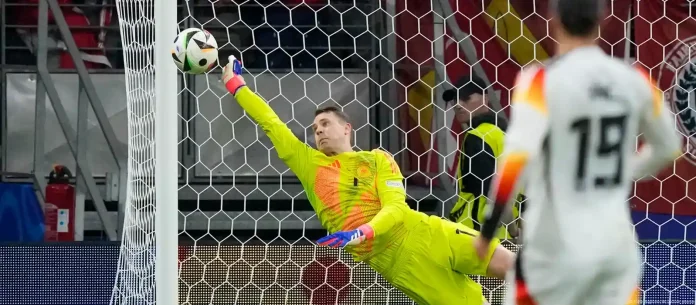The UEFA European Football Championship, commonly known as the Euros, is one of the most prestigious football tournaments on an international scale. Hosting such an event is a great honor for countries all over the world, but it also comes with great obligations and influences. Germany is a contender to host UEFA European Football Championship but they might fail to overcome the harmful environmental impact on the sports event.
Germany is not recognized for strict environmental guidelines and sustainable practices and this is why the country might face very challenging situations that would outweigh the benefits of hosting this most important sporting event. Here’s why Germany might not be the right choice to host the event due to various environmental concerns.
Increased Carbon Footprint
Germany, seen as committed to reducing carbon emissions, should see a temporary increase in its carbon footprint during the tournament. Aviation is a top contributor to global warming, and while Germany is making strides in renewable electricity and emissions reductions, the transient increase in emissions from the event may undermine those efforts. In addition, the transport infrastructure needed to deal with the influx of visitors, including additional buses, trains, and engines, contributes to the environmental burden.
A 2020 IPSOS survey in Germany highlighted the environmental issues that respondents believed required the most attention from local leaders. The top concerns were:
Global warming or climate change (44%)
Air pollution (41%)
Plastic waste and pollution (38%)
Consumption of Resources and Generation of Waste
Hosting an event of this magnitude requires full-size resources, from production materials for stadiums and fan zones to food and liquids for attendees. The construction or renovation of stadiums alone requires a huge amount of energy and raw materials, which often have extensive effects on the environment. In 2020, Germany generated nearly 10.9 million tons of food waste, with private households contributing more than half of this total—about 6.5 million tons. This amount equates to roughly 78 kg per person.
In addition, a huge amount of waste will be generated on this occasion. The ecological footprint of waste management can be huge, from disposable plastics to food waste. Despite Germany’s advanced recycling systems, the sheer scale of waste produced throughout the championship could put pressure on existing waste management infrastructure and lead to increased use of landfills.
Impact on Local Ecosystems
Improving and expanding infrastructure to support the event may have detrimental effects on surrounding ecosystems. The construction of recent stadiums or the expansion of current ones often requires land clearing, which can disrupt the surrounding natural environment and biodiversity. In urban areas, visitors and production activities at the foot of the construction site can lead to soil erosion and pollution of water sources. From 2015 to 2018, agricultural land decreased by 0.4%, whereas the area of forests and woodlands grew by 0.2%.
Load on Energy Resources
The energy requirements of hosting an international soccer tournament are enormous. From lighting stadiums to powering broadcast equipment and maintaining fan zones, energy consumption can be high at some stage of an event. Although Germany has made significant investments in renewable energy sources, the increased challenge for everyone during the tournament should stress the United States’ energy resources and potentially lead to reliance on much less sustainable energy sources.
In addition, a short-term increase in energy consumption could lead to a multiplication of greenhouse gas emissions if the additional electricity required was provided through non-renewable assets. This should combat Germany’s long-held dreams of transitioning to a more sustainable energy utility.
Traffic Jams
The event will cause a large increase in transport requirements, including the movement of people and goods. Traffic congestion can have various environmental impacts, consisting of improved air pollutants and better carbon emissions. Additionally, the construction of temporary delivery infrastructure that includes additional parking facilities or tour offerings will have environmental impacts.
German public transport is pretty advanced, but the scale of the event may want to overwhelm the current capacity, mainly the multiplied use of private engines and the consequent deterioration of the environment. In 2018, Germany experienced a record 745,000 registered traffic jams, marking a 3% increase from 2017. This figure translates to over 2,000 traffic jams each day.
Long-term Environmental Legacy
While the impacts of the quick period are great, we must not now overlook the long-term ecological legacy of hosting a primary event like the UEFA European Championship. The creation of recent infrastructure and stadiums often leaves a long-lasting mark. If these centers are not successfully applied after this opportunity, they may be underutilized and contribute to urban sprawl and waste of useful resources.
Furthermore, the environmental training gained from the website hosting the event can be overshadowed by the immediate blessing of improved tourism and financial growth. This can lead to a missed opportunity to improve sustainable practices and improve environmental guidelines in the long term.
Conclusion
Germany doesn’t have much potential to host the UEFA European Football Championship anymore due to many factors. The country doesn’t have the needed strong infrastructure that could make the event a success. The environmental impact of such an event is large and Germany might not be able to bare it. Accelerating carbon footprint, useful consumption of resources, era of waste, pressure on energy resources, and pressure on surrounding ecosystems pose huge challenges.
Careful attention and mitigation techniques should be in place for Germany to adapt to its environmental wishes and sustainability commitments. This could include stricter environmental rules for construction, better waste management practices, and huge investments in sustainable transport options.
Ultimately, while hosting the UEFA European Football Championship should increase national satisfaction and economic benefits, the environmental toll could be recorded. Germany must carefully consider these elements and discover alternative ways of celebrating and supporting football that are in line with its environmental values and aspirations for sustainability.











